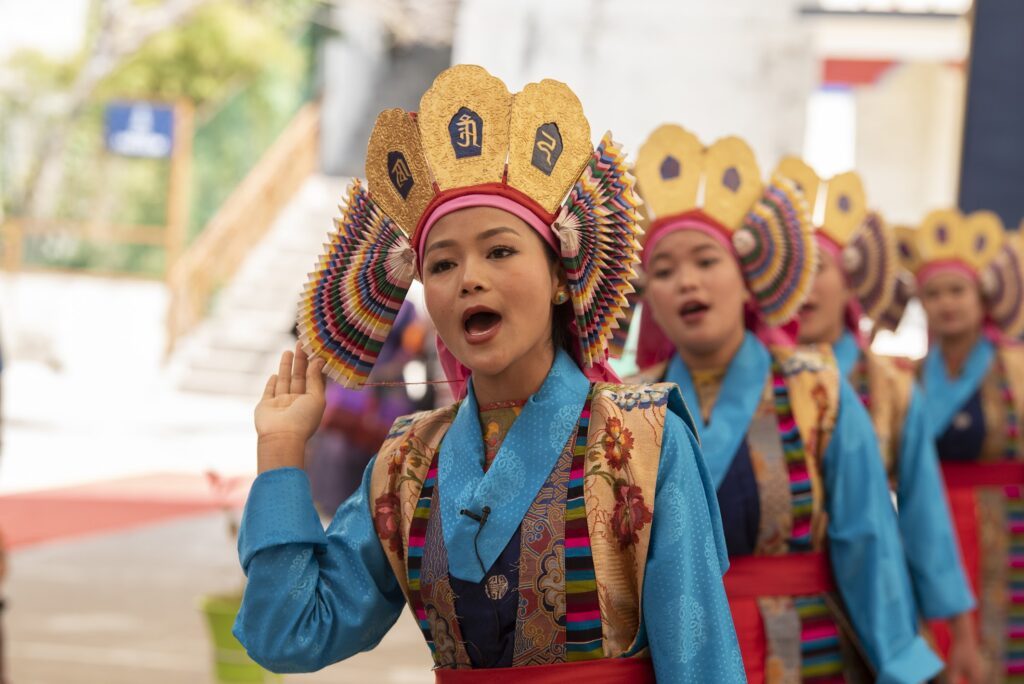By Tsering Dhundup
DHARAMSHALA, April 12: The 27th Shoton festival in exile kicked off at the Tibetan Institute of Performing Arts in Dharamshala on Wednesday, and is scheduled to go on till 22nd April. The 13-day event features opera troupes from various parts of India, and one each from Nepal and North America, including students performing various traditional opera performances.
On the opening day of the festival, in his speech chief guest Kundeling Tatsak Rinpoche stated “Despite Tibet’s continued difficulties and the geographical separation of Tibetans inside and outside of Tibet, we should be proud of our capacity to host the Shoton Festival of this magnitude in exile, drawing ever-larger crowds of participants,”
This year’s edition will showcase thirteen troupes from India, Nepal, and the US. Kalimpong and Odisha Opera Association will present “Drowa Sangmo” on April 11th, followed by the Nepal Opera Association with “Choegyal Drimey Kunden” on April 12th, and the Chaksampa Opera Company showcasing “Sukyi Nyima” on April 13th. THF School will perform “Kenlop Chosum” on April 14th, while Mainpat Opera Association will present “Sukyi Nyima” on April 15th. The Kollegal Opera Association will perform “Chungpo Dhonyo Dhondup” on April 16th, the Bylakuppe Opera Association on April 17th with “Pema Woebar,” and the Bhandara Opera Association on April 18th with “Chungpo Dhonyo Dhondup.” TCV Chauntra will perform “Mila Repa” on April 19th, TCV Upper with “Sukyi Nyima” on April 20th, and Mundgod Opera Association with “Choegyal Norsang” on April 21st. Finally, TIPA will conclude the festival with “Dhepa Tenpa” on April 22nd.
The origins of the Shoton Festival, also known as the “Yoghurt Festival,” are surrounded by various theories. One theory traces its roots to ancient India, where monks observing monastic disciplines consumed a vegetarian diet for months and were served yoghurt during the full moon. This tradition transitioned to Tibet, where monasteries observed a summer retreat known as “Yarne” for over a month. At the conclusion of this retreat, devotees from nearby villages visited the monks of Drepung Monastery, offering fresh milk and farm products. Over time, this event evolved into the Shoton Festival.
Another theory suggests that the festival emerged from a festive event held at Drepung Monastery in the 17th century to commemorate the enthronement ceremony of the fifth Dalai Lama as the spiritual and temporal head of unified Tibet.
However, the invasion of Tibet by the Chinese army in 1959 disrupted the festival. With the occupation of Tibet, the opera troupes disbanded, and performances were banned, leading to the abrupt end of the Shoton Festival.
In the words of Late opera master Norbu Tsering, “Many of the opera artists were imprisoned and tortured. After years in prison, we were involuntarily taken to Beijing to be paraded before Chairman Mao as the artists from the exotic west (Chinese, Xizhang), representing members of the so-called Ethnic Minority.”
However, in 1962, sensing the cultural grip of Ache Lhamo over Tibetan people, remaining opera artists were coerced into performing the opera Nangsa Woebum. The text, narration and dialogues are highly censored to hype the Communist propaganda. These days in Tibet, opera performances and troupes are reduced to and exploited as marketing brands to cater burgeoning tourist industry.
In exile, efforts were made to revive the tradition. His Holiness the Dalai Lama encouraged opera enthusiasts to maintain this unique tradition. The Tibetan Institute of Performing Arts in Dharamshala played a significant role by initiating a special curriculum in the 1970s to teach opera to young artists and organizing modest opera festivals in the 1980s and 1990s. In 1993, the first ‘Grand Shoton Festival’ in exile took place which was participated by only four troupes. Over time, the number of participants in opera performances grew, with school children increasingly engaging in the opera culture. This year, the involvement of three schools alongside nine opera troupes show a positive trend towards the revitalization and expansion of Tibetan opera within the exile community.










